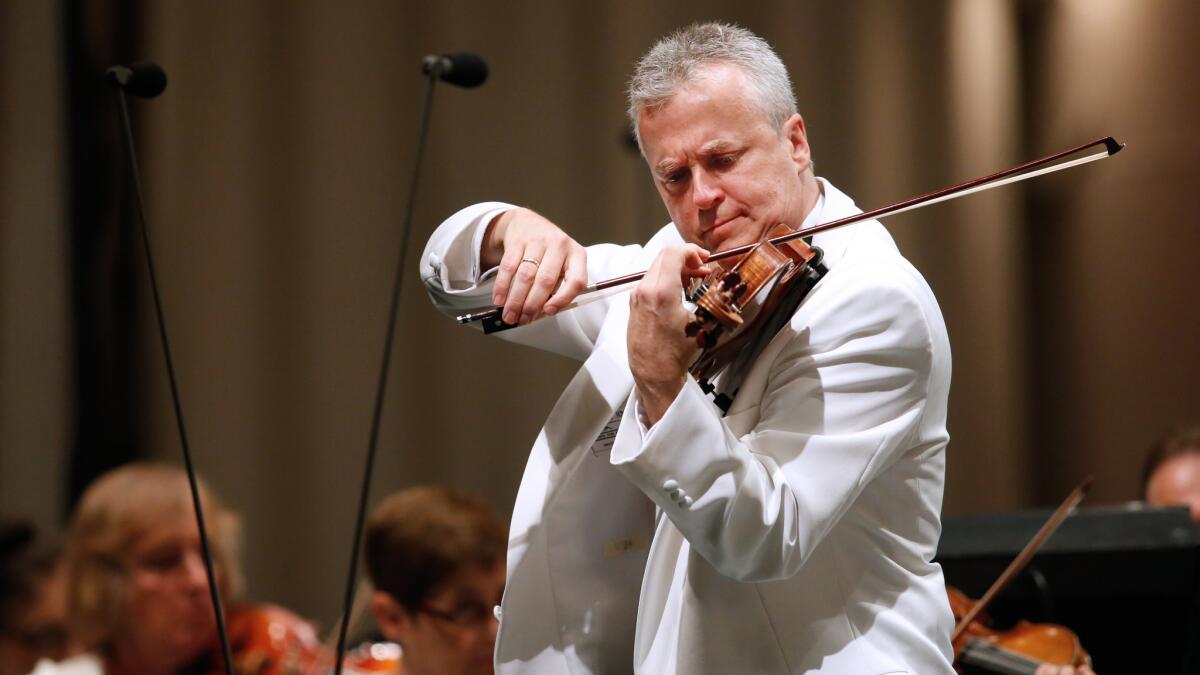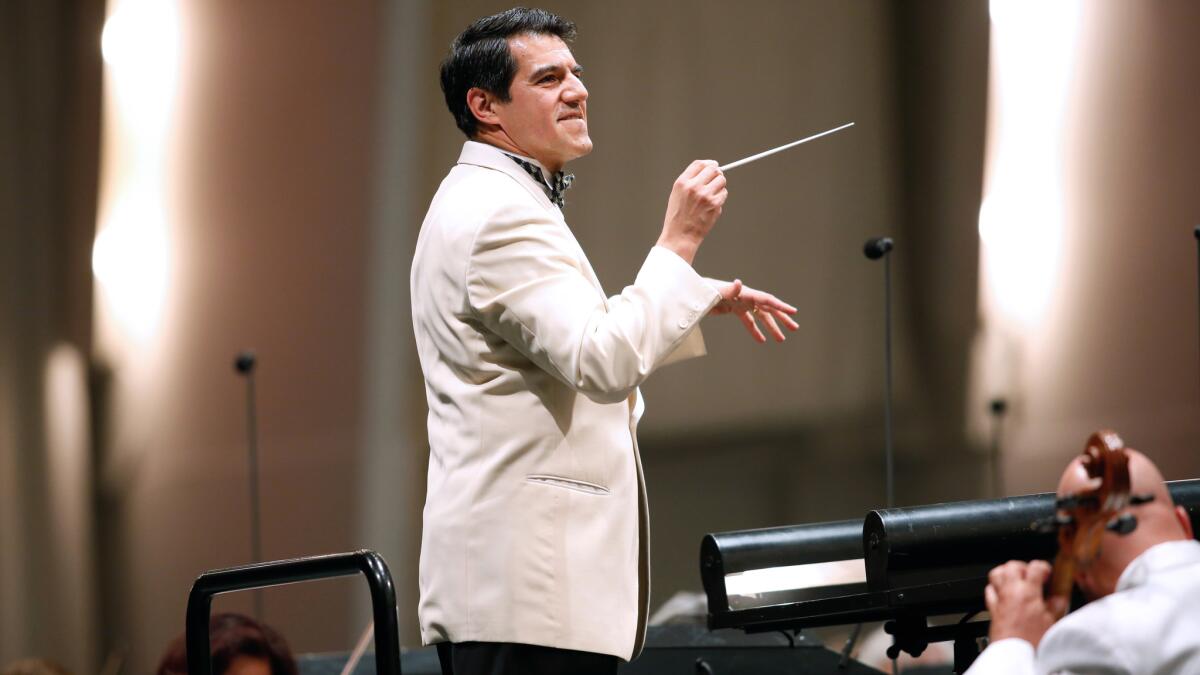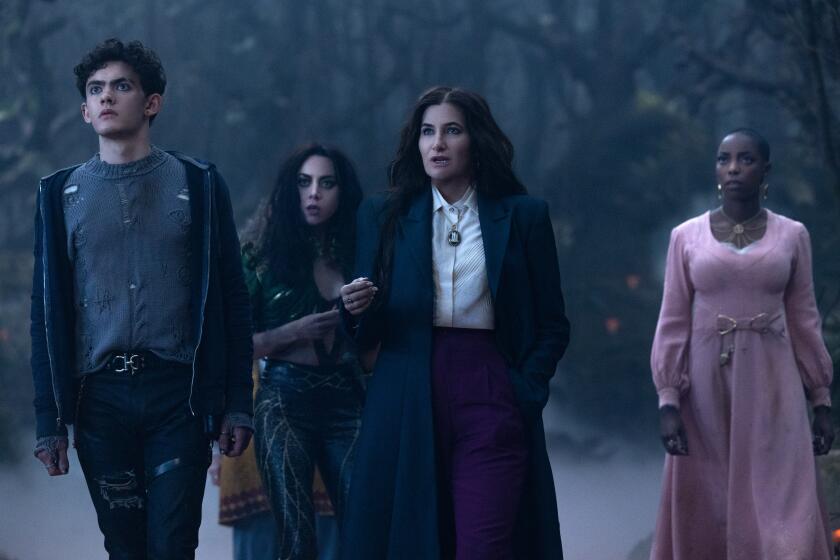Review: Long-neglected music gets a fresh L.A. Phil spin at the Hollywood Bowl

The end of the long Hollywood Bowl season is near for the Los Angeles Philharmonic, a time when the routine could creep in.
But Tuesday night, an unusual program seemed to keep both the musicians’ playing and listeners’ ears fresh, lively and committed.
The first half was made up of what used to be known as “light classics,” music once featured on your parents’ or grandparents’ record collection from Reader’s Digest or Time Life but now sadly neglected. Here, the pieces were by Johann Strauss Jr. and Fritz Kreisler.
The second half consisted of a single and much heavier work, though not without its sweeter parts: Richard Strauss’ sprawling tone poem “Ein Heldenleben,” challenging music for orchestra and audience alike.
SIGN UP for the Essential Arts & Culture newsletter »
On the podium was Miguel Harth-Bedoya, formerly the orchestra’s associate conductor, now chief conductor of the Norwegian Radio Orchestra and longtime music director of the Fort Worth Symphony Orchestra. The concert also celebrated concertmaster Martin Chalifour’s 20th season at the venue — doing so by making him work overtime as the soloist in the Kreisler pieces as well as in “Ein Heldenleben.”
The Kreisler works — seven in all — were a delight to hear again. These are short, charming, sentimental and tuneful, often with some dashing virtuosic passages thrown in. They were written mostly for Kreisler himself to use as encores, but other violinists also took them up back in the day. Chalifour began with one of Kreisler’s marvelous fakeries, the “Praeludium and Allegro,” which he attributed to 18th century composer Gaetano Pugnani before eventually coming clean.
Throughout the set, which included such once-popular items as “Caprice Viennois,” “Tambourin Chinois,” “Liebesleid” and “Liebesfreud,” Chalifour paid allegiance to Kreisler’s sometimes gooey playing style without overdoing it. His portamento was applied more as graceful decoration than expressive swoon, his rubato more as sculpted detail than extravagance. In short, his was a modern, crisp and elegant approach that served these little bonbons well.
Harth-Bedoya and the orchestra supported him warmly and unobtrusively.

After intermission, they took on “Ein Heldenleben” (A Hero’s Life) with considerable spirit and poise. This descriptive work is autobiographical, the hero of the piece being the composer. It unwinds continuously in six sections: “The Hero,” “The Hero’s Adversaries” (sniping music critics, it turns out), “The Hero’s Companion” (the composer’s wife, a long and chatty violin solo), “The Hero’s Battlefield,” “The Hero’s Works of Peace” (in which the composer quotes the earlier music of one Richard Strauss), and “The Hero’s Retreat From the World and Fulfillment.”
The piece is fascinatingly outlandish, using a large orchestra and predicated on the clash and contrast of sweeping, vaulting themes in a kind of leitmotif soup. But it is not entirely successful in that Strauss piles it all on rather too thickly and at great length. Less would have been more.
The performance, not without blemish and becoming somewhat murky at climaxes in the Bowl’s amplification, was nevertheless a good one. Harth-Bedoya has a fluent, clear and easygoing conducting style, and he kept any potential lumbering well at bay, the music at all times light on its feet and well motivated. Chalifour played the violin solo with wonderful clarity and expressive detail, showing no signs of fatigue.
The addition of movement titles on the giant screens would have been a reasonable and useful thing.
The concert opened with a waltz and polka, the “Emperor” and the “Thunder and Lightning,” respectively, both by Johann Strauss Jr. The “Emperor” was niftily and trippingly dispatched, its pomp and circumstance a little understated perhaps but so easily flowing as to be irresistible. The “Thunder and Lightning,” on the other hand, seemed a little wimpy, the sonic winds indelibly outlined, but the booms and flashes underwhelming.
Follow the Times’ arts team on Twitter @culturemonster
More to Read
The biggest entertainment stories
Get our big stories about Hollywood, film, television, music, arts, culture and more right in your inbox as soon as they publish.
You may occasionally receive promotional content from the Los Angeles Times.










